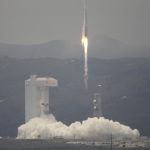The U.S. Department of Defense’s Defense Innovation Unit (DIU) has announced a solicitation under the Transition of Quantum Sensors (TQS) Program, aiming to enhance the capabilities of U.S. forces through advanced quantum technology.
This initiative seeks proposals for the development and demonstration of quantum sensors that will play a role in improving the Position, Navigation, and Timing (PNT) capabilities of military operations, amid increasing threats of GPS signal interference. Submissions are due by May 29 2024.
Background and Urgency of the TQS Program
The vulnerability of traditional GPS and classical sensor technologies in critical military operations has prompted the DoD to seek more resilient and precise alternatives. Quantum sensors, leveraging atomic-level design, offer substantial improvements in accuracy and sensitivity. These sensors are envisioned to significantly reduce dependency on GPS by providing reliable navigation solutions even in GPS-denied environments.
Program Focus and Areas of Interest
The TQS Program is particularly focused on demonstrating the military utility of quantum sensors across various domains, including inertial measurement units (IMUs), magnetic navigation (MagNav), and anomaly detection. Key areas include:
- Inertial Sensing: Development of gyroscopes and accelerometer-based sensors with reduced drift and enhanced performance metrics.
- Magnetic Sensing: Advanced capabilities for magnetic field anomaly detection and MagNav systems that are immune to jamming and spoofing.
- Technology Insertions: Enhancements in integrated photonic systems and laser components aimed at improving sensor performance and efficiency.
Desired Outcomes and Solution Attributes
The DoD anticipates operational demonstrations of these technologies within five years, with mid-course functional demonstrations and subsequent integration into military operations. Proposals are expected to address the scalability of technology, modularity, and integration with current systems under stringent operational conditions.
Invitation to Innovators and Industry Collaboration
The TQS Program invites commercial entities, research institutions, and international partners to submit proposals that can lead to rapid prototyping and deployment. Collaboration among technology providers, integrators, and operational teams is strongly encouraged to ensure that the developed solutions are comprehensive and meet the tactical demands of the DoD.
Future Impacts and Strategic Importance
The successful integration of quantum sensors is expected to redefine the landscape of military technology by providing more reliable and secure navigation and sensing solutions that are critical for national security. The DoD’s proactive approach through the TQS Program highlights the strategic importance of quantum technologies in maintaining and enhancing the operational capabilities of the U.S. military in the global arena.






